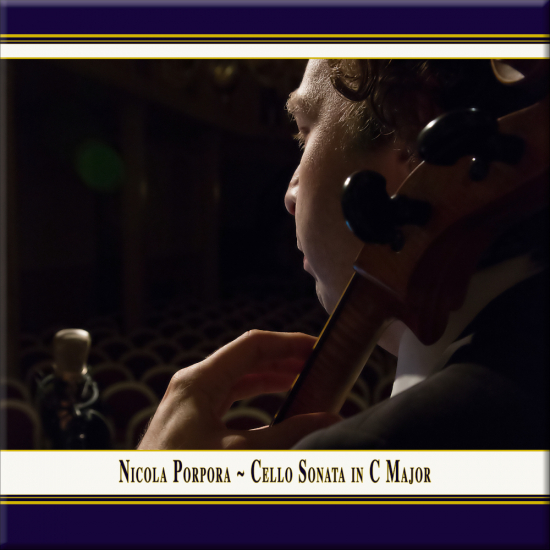Porpora: Cello Sonata in C Major
Track
Cello Sonata in C Major
for Cello, Violin & Basso Continuo,
performed according to the traditions of the time
by the Ensemble Nel Dolce:
Harm Meiners (Cello) · Olga Piskorz (Violin) · Flóra Fábri (Harpsichord)
A live recording from Bad Homburg Palace in Germany
HD Recording · DDD · Duration: 7:58
Digital Album [here: MP3/320kBit/sec.]
4 Tracks · Digital Booklet
MP3 Album
320 kBit/sec.


N
icola Antonio Porpora (17 August 1686 - 3 March 1768) was an Italian composer and teacher of singing of the Baroque era, whose most famous singing students were the castrati Farinelli and Caffarelli. Other students included composers Matteo Capranica and Joseph Haydn. Porpora was born in Naples. He graduated from the music conservatory Poveri di Gesù Cristo of his native city, where the civic opera scene was dominated by Alessandro Scarlatti. Porpora's first opera, Agrippina, was successfully performed at the Neapolitan court in 1708. His second, Berenice, was performed at Rome. In a long career, he followed these up by many further operas, supported as maestro di cappella in the households of aristocratic patrons, such as the commander of military forces at Naples, prince Philip of Hesse-Darmstadt, or of the Portuguese ambassador at Rome, for composing operas alone did not yet make a viable career. However, his enduring fame rests chiefly upon his unequalled power of teaching singing. At the Neapolitan Conservatorio di Sant'Onofrio and with the Poveri di Gesù Cristo he trained Farinelli, Caffarelli, Salimbeni, and other celebrated vocalists, during the period 1715 to 1721. In 1720 and 1721 he wrote two serenades to libretti by a gifted young poet, Metastasio, the beginning of a long, though interrupted, collaboration. In 1722 his operatic successes encouraged him to lay down his conservatory commitments. (From Wikipedia, the free encyclopedia)
P
ublishing Authentic Classical Concerts entails for us capturing and recording outstanding performances and concerts for posterity. The performers, audience, opus and room enter into an intimate dialogue that in its form and expression, its atmosphere, is unique and unrepeatable. It is our aim, the philosophy of our house, to enable the listener to acutely experience every facet of this symbiosis, the intensity of the performance, so we record the concerts in direct 2-Track Stereo digital HD. The results are unparalleled interpretations of musical and literary works, simply - audiophile snapshots of permanent value. Flourishing culture, enthralling the audience and last but not least also you the listener, are the values we endeavor to document in our editions and series.
Music that is new, pieces worth listening to and well worth conserving, little treasures from the traditional and the avantgarde - music that is unimaginable anywhere else but in the hotbed of Europe - we capture these in our Castle Concerts Series of recordings in their original settings in cooperation with Volker Northoff.
Andreas Otto Grimminger & Josef-Stefan Kindler, K&K Verlagsanstalt




